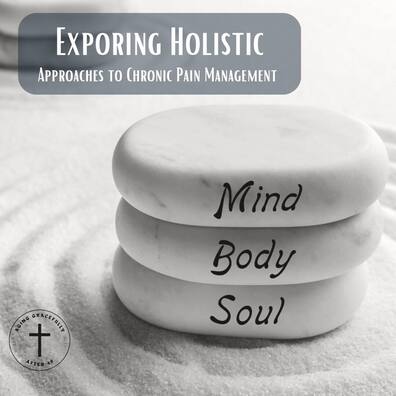|
Welcome to Wisdom for Wellness, your midweek health boost that's here to invigorate your journey to well-being and inspire a life of vibrant health! Chronic pain is a pervasive issue that affects millions of individuals worldwide. It's a complex condition that can be debilitating, not just physically but emotionally and mentally as well. Traditional medicine often turns to medication for relief, but there's a growing interest in holistic approaches to pain management. These methods aim to treat the whole person, not just the symptoms. In this Wisdom for Wellness blog post, we'll dive into the world of holistic pain management and discuss how various practices can contribute to overall well-being and pain relief.
Holistic pain management recognizes that chronic pain is influenced by a multitude of factors, including physical health, emotional state, diet, and lifestyle. Therefore, a holistic approach is multifaceted, incorporating physical therapies, nutritional adjustments, mental health support, and lifestyle changes to address these various aspects. One of the cornerstones of holistic pain management is physical therapy. Techniques such as massage, acupuncture, and chiropractic care can help alleviate pain by improving circulation, reducing inflammation, and enhancing mobility. These therapies can also help to release endorphins, the body's natural painkillers, providing a sense of relief and relaxation. Nutrition also plays a critical role in managing chronic pain. Anti-inflammatory diets rich in omega-3 fatty acids, antioxidants, and phytonutrients can help reduce inflammation, a common cause of pain. Incorporating foods like leafy greens, berries, nuts, and fatty fish can make a significant difference in pain levels and overall health. Mental health support is another key element of holistic pain management. Chronic pain can lead to stress, anxiety, and depression, which in turn can exacerbate pain. Mindfulness practices, meditation, and cognitive-behavioral therapy can help individuals develop coping strategies, reduce stress, and improve their emotional well-being. Lifestyle changes are also essential. Regular exercise, adequate sleep, and stress management techniques can all contribute to reducing pain and enhancing quality of life. Gentle exercises like yoga and tai chi can improve flexibility and strength without putting too much strain on the body. Quality sleep is crucial for healing and recovery, while stress management techniques like deep breathing exercises can help keep the body's stress response in check. Finally, exploring the use of natural supplements and herbs may provide additional support for chronic pain management. However, it's important to consult with a healthcare professional before starting any new supplement regimen to ensure safety and proper usage. In conclusion, holistic approaches to chronic pain management offer a comprehensive way to address the multifaceted nature of pain. By considering the whole person—body, mind, and spirit—individuals can find relief and improve their quality of life. Remember, it's about finding what works for you and creating a personalized plan that supports your journey to wellness. That’s it for this week’s wellness tip. Go forward this week and let your light shine bright, touching hearts and inspiring change, as you make a positive impact on the lives of those around you. God bless and make it an awesome week! Closing Quote: "Chronic pain may be a part of your story, but holistic approaches can help you turn the page to a chapter filled with relief, resilience, and renewal."
0 Comments
Leave a Reply. |
What
|

 RSS Feed
RSS Feed
